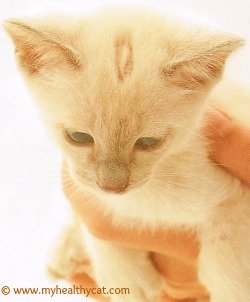Symptoms of Worms in Cats
"Worms are parasites that
can harm your cat's health."
List of Common Types of Worms in Cats
Here's a list of worms in cats your kitty may be susceptible to:
- ringworm (not technically a "worm"),
- roundworms (most common),
- tapeworm,
- hookworms, and
- lungworms.
These worms can be classified as either external parasites (also called "ectoparasites") or internal parasites (also called "endoparasites").
External parasites are found on the outside of your kitty's body. Fleas, ticks and ear mites are also common external parasites.
Internal parasites live inside the bodies of kitties.
All of these worms are unhealthy for your cat or kitten, and depending on the severity of the infestation, some can be extremely debilitating to their health.
Ringworms
 Kitten with Ringworm
Kitten with RingwormRingworms (Dermatophytosis) are external parasites. This type of worm is not technically a "worm," but rather a fungal disease of the skin and hair.
Ringworm is highly contagious to humans and to other animals.
It's always a good idea to wash your hands after petting a cat, especially one you don't know. Felines can sometimes be carriers and infect you without showing any symptoms.
Many longhaired cats can carry the ringworm spores and not show any signs at all of the parasite.
See my Cat Ringworm page for details about symptoms, diagnosis, and treatment, as well as a cat ringworm picture.
Roundworms
Roundworms (ascarids) are the most common internal parasites that inflict our feline friends. Some statistics say that almost one-third of all kittens under three months old have roundworm, and about 10 per cent of all adult felines have it.
Roundworms are thin and can range from three to six inches long. They look like spaghetti noodles. Sometimes you can see them wriggling in your kitty's feces or even their vomit.
But if you don't see them, don't rule out the possibility that your cat or kitten may have them if he or she is in otherwise good health, but somehow seems in poor shape (for example, a dull coat, gas in the intestines causing a pot belly appearance, and diarrhea).
Your veterinarian can exam your kitty's feces (you'll have to take in a sample) to determine if there are roundworms.
An infected mother cat can pass this parasite to her nursing kittens. Adult cats get it by ingesting the eggs of this parasite, or by ingesting an infected rodent or the feces of an infected cat.
Children are also susceptible to cat roundworm. If you have a sandbox that children use and there is the possibility that an infected animal may have used it, too, then a child can be exposed to, and get, the parasite if he or she puts a dirty hand to his or her face. (And of course, the litter box should be off limits to small kids.)
Tapeworm
Among tapeworms (Cestodes), the most common is Dipylidium caninum (this worm also infests dogs).
A tapeworm is an internal parasite and you can find evidence of these in your kitty's litter box.
These are the worms in cats that look like little grains of rice or sesame seeds that can be found in your feline's feces.
Here's more information on tapeworms and tapeworm treatment.
Hookworms
Hookworms are internal parasites and are found inside your feline's intestines. They get their name from their hook-like teeth that they use to attach to your kitty's intestines.
Of all the internal parasites, these can be the most harmful because the hooks that they use to attach to the intestines can cause the intestines to bleed.
In fact, these worms are sucking blood from your cat and can cause severe anemia. Hookworms are particularly dangerous to kittens.
The primary symptom of hookworms is anemia in your kitty. You might notice the anemia because it causes your cat's gums to be pale. You may also notice a change in color to the nose. Your kitty will also lack energy and may become thin.
Unlike tapeworm or roundworm, you probably won't be able to see these worms in your kitty's feces due to their small size. However, in young kitties, the bleeding of the intestines causes the feces to appear black and tar-like, although it could become fluid and smell really bad. You might also be able to notice some blood in the stool.
Your veterinarian should do a fecal exam to determine their presence.
Once diagnosed, your vet can give you medication to get rid of these harmful parasites.
Fortunately, hookworms are less common worms in cats than tapeworm and roundworm.
Lungworms
Cats can get lungworms by eating infected birds or rodents.
The larvae of the lungworm make their way through your kitty's intestines and lymph nodes. They eventually become adult worms and enter the lungs through the bloodstream.
Lungworms often go undiagnosed because their symptoms are similar to bronchitis or pneumonia (coughing and difficulty breathing) and they are usually only seen with a really heavy infection.
Fortunately, lungworm infestation is rare.
But if your kitty is exhibiting these symptoms, it's important to take him or her to your veterinarian to get a proper diagnosis and treatment.
Treatment

If you think that your kitty might have any of these types of worms in cats, it's best to get veterinary advice or treatment immediately.
This will help to prevent the infestation in your cat or kitten from becoming worse, and it will also help protect other pets and humans around them.
If caught early, many worms in cats are easily treated with conventional worming medication or natural homeopathic remedies.
Related Articles
Worms from Your Cat - Yep. You can get worms from your cat. Here's what you can get and how to avoid getting them!
Common Cat Health Problems - Information about problems you need to know about to keep your feline friend healthy.
Use the Search Box to find more feline info. |
From Worms in Cats to My Healthy Cat home page
If you suspect your cat is ill, please contact your veterinarian immediately.
The material presented in this site is for informational and entertainment purposes only. It is not intended to replace your veterinarian's advice.
Copyright 2003-2025 © www.myhealthycat.com
Sitemap | Contact Us | About Us | Disclosure | Privacy Policy

